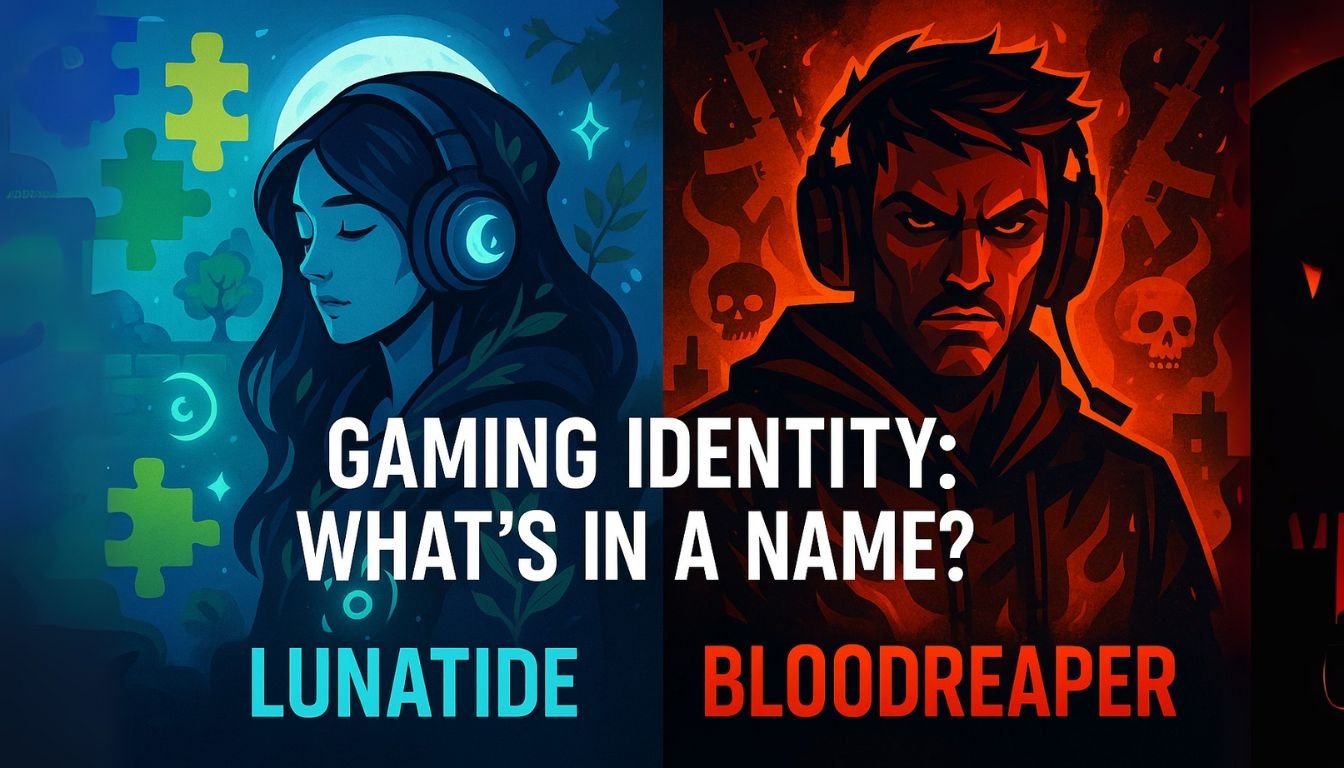
Hey, ever notice how gaming names can feel like a secret handshake? Like, you see “xXxKillerWolfxXx” in a lobby and kinda assume it’s a dude, but then “StarBloom” pops up, and you’re not so sure.
Gaming names—or gamertags—are a big deal in online worlds, and they’re super different between guys and gals. Why? It’s a mix of personality, game vibes, and dodging the weird stuff online. Girls often pick neutral or guy-sounding names to fly under the radar, while guys lean into tough, in-your-face tags.
Let’s chat about why this happens, what’s shaping these choices, and where it’s all headed, based on some solid research.
Quick Key Points
- Girls often go for neutral or masculine names to avoid harassment, with about 59% picking non-gendered tags to blend in.
- Guys tend to choose aggressive names like “Slayer” in competitive games, but some (around 29%) play female characters, which can mix up their name vibe.
- Game types matter: shooters, where guys dominate, see edgier names; puzzles or sims, more popular with girls, have playful or creative ones.
- Harassment pushes girls to hide their gender, while guys face less pressure, so their names are often bolder.
- As more women game (now 45-50% of players), names are getting more inclusive, but safety’s still a big deal for girls.
The Old Days: How It All Started
Back in the arcade days, everyone just punched in three letters like “AAA” for high scores—no gender vibes there. When online gaming kicked off with stuff like Xbox Live in 2002, guys ruled the scene, rocking names like “xXxDarkSniperxXx” to sound tough.
Girls were a smaller crowd, maybe 10-20% of players, so they often picked names that didn’t scream “I’m a girl” to avoid creepy messages. Fast forward to now, with women making up nearly half of gamers, names are evolving, but the split’s still clear.
Studies show guys often pick names with negative vibes, like “Death” or “Nightmare,” while girls lean toward subtle or story-rich ones, especially in games like World of Warcraft where numbers aren’t allowed to keep things immersive.
- Early days were guy-heavy: Gaming was marketed to boys, so aggressive names like “Killer” were the norm.
- Girls stayed low-key: With fewer women playing, they picked neutral names to avoid standing out in a dude-filled space.
What the Research Says
Studies dig deep into why names differ. A survey of 900 women gamers across the US, China, and Germany found 59% use neutral or masculine names to dodge harassment. One gamer said, “We hide our gender so we don’t get hit on.” In the US, 68% of women pick male-sounding names or avatars for fairer treatment, while 54% of guys sometimes go for female ones.
In China, a study of 3,658 women playing Final Fantasy XIV showed 78% use male characters, partly for anonymity and partly for fun, like indulging in male-male romance vibes.
- Safety drives girls’ choices: Harassment’s a big issue—79% of women report sexism, so neutral names like “SkyWarden” help them game in peace.
- Guys flex more: Less pressure means males pick bold names like “BloodReaper” to stand out, especially in competitive scenes.
Another study looked at how people guess gender from names in games like shooters versus RPGs. Shooter names are seen as “guy” territory, but skill doesn’t change guesses—genre vibes do. Women face more bias here, so they often pick names that don’t hint at gender, like nature or myth-inspired ones.
Games Shape the Vibe
The type of game you play totally changes your name. Shooters like Call of Duty are guy-heavy (only 4% women in tactical ones), so names get aggressive—“SniperElite” or “DeathDealer.” In contrast, women make up 60%+ of players in sims like The Sims or puzzle games, where names are more fun, like “PixelPetal” or “CozyElf.”
A big survey of 270,000 gamers showed women love completion and fantasy vibes, while guys go for competition and destruction. This shows up in names: guys go hard in shooters, girls get creative in RPGs.
- Shooters = tough names: Male-dominated games push names that intimidate, often with numbers for uniqueness.
- Sims and puzzles = playful tags: Women lean toward light, creative names in games where community’s key.
Here’s a quick table based on research showing genre preferences:
| Game Type | % Female Players | % Male Players | Common Name Style |
|---|---|---|---|
| Shooters | 4-10% | 90-96% | Aggressive, numbers (e.g., “xXxKiller69xXx”) |
| RPGs | 40-50% | 50-60% | Creative, mythological (e.g., “StarBloom”) |
| Sims/Puzzle | 60-69% | 31-40% | Playful, cozy (e.g., “SunnyFarm”) |
Harassment’s a Big Deal
Harassment’s a huge reason girls pick certain names. Around 63% of women get harassed online, and 79% say sexism’s common in gaming. This pushes many to use neutral tags like “CloudWalker” or even masculine ones like “IronBlade” to avoid creepy comments or blame for losses.
Some women on social media share how they use mythological names to stay subtle but still express themselves. Others go feminine, like “LunaQueen,” to connect with other women, but that’s riskier.
- Neutral names for safety: Women often avoid gendered tags to skip harassment or unfair blame in team games.
- Guys face less heat: Males can pick bold names without worrying about targeted abuse.
Playing with Character Gender
Here’s a twist: about 29% of guys play female characters, while 9% of women pick male ones. In RPGs, 60% of female avatars are actually played by guys, often for customization or to mess around.
This can blur name choices—guys might pick softer names to match a female character, while women go tough to match a male one. For example, a woman might choose “SteelKnight” for a male avatar to dive into the game without bias.
- Guys experiment more: Some males pick feminine names for fun or aesthetics, like “RoseViper.”
- Women seek fairness: Female players use male names to avoid judgment, especially in competitive games.
Where Names Are Headed
With women now nearly half of gamers, names are getting more inclusive. Social media posts show women using neutral tags to game safely but also starting to embrace feminine ones to connect with others, like “GamerGal_X.”
Guys are playing with more variety too, sometimes picking names to match female characters or just to be funny. As games like VR and metaverses grow, cross-platform IDs might make names more consistent, and AI tools could help craft tags that feel personal but safe.
- More women, more variety: As gaming balances out, feminine names are popping up, though safety’s still key.
- Future’s flexible: AI-generated names and unified IDs could let everyone express themselves without as much hassle.
Wrapping It Up
Gaming names are like your online outfit—they show who you are, but also what you’re dealing with. Girls often pick neutral or masculine tags to dodge harassment, while guys go for bold, aggressive ones to flex in competitive spaces.
Games, culture, and platform rules all shape these choices, but as more women join the scene, the gap’s narrowing. Whether you’re “ShadowWolf” or “SunnySprite,” your tag’s a mix of strategy and personality. What’s yours say about you?
Quick Comparison Table
| Aspect | Female Names | Male Names |
|---|---|---|
| Common Style | Neutral, mythological (e.g., “StarBloom”) | Aggressive, power-focused (e.g., “xXxSlayerxXx”) |
| Motivation | Avoid harassment, blend in | Show dominance, fit competitive vibe |
| Popular Genres | Sims, puzzles, RPGs | Shooters, strategy, sports |
| Character Gender | 9% pick male | 29% pick female |
| Challenges | Harassment pushes anonymity | Less pressure, freer expression |



